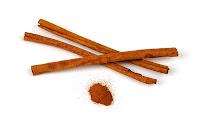This blog has moved to a new website
Nutrition, Health & Wellness
Spices are known to exert several health benefits including diabetes control effects. The beneficial physiological effects of spices for diabetes include interim hypoglycemia and long term improved glucose tolerance. Though spices are used to add taste and flavor to food, they have effects over various organ systems of the body contributing to diverse physiological and metabolic outcomes. Many animal experiments and clinical trials have given evidence of spices and their extracts giving hypoglycemic effects and a few of the spices are discussed here.
Cinnamon (Cinnamomum zeylanicum)
 |
| image of cinnamon bark by Luc Viatour / www.Lucnix.be/ (CC BY-SA 3.0) |
Fenugreek seeds ( Trigonella foenumgraecum)
Fenugreek seeds are used in traditional Indian medicine for treatment of diabetes. In research studies conducted by A Gupta et al at Jaipur Diabetes Research Centre, it was concluded that fenugreek seeds improves glycemic control and decreases insulin resistance in mild type-2 diabetes. There is also a favourable effect on hypertriglyceridemia. As these spices taste bitter their consumption is a problem. Soaked seeds can be chewed or swallowed. In Indian cuisine fenugreek seeds are added to enhance taste.
Garlic (Allium sativum)
Garlic has a long history in traditional medicine as a cure for many ailments, including diabetes. Evidence from scientific studies suggest that these spices have antiglycative, antiinflammatory and antioxidative properties. These properties help in prevention of diabetes progress and related complications. Garlic can be used in food preparation.
Onions (Allium cepa)
Imad M. Taj Eldin et al, of Department of Pharmacology, Faculty of Pharmacy, University of Gezira, Sudan, in their studies on Allium cepa (red onion) have concluded that crude onion produced blood glucose reducing (hypoglycemic) effects and that it could be used as a dietary supplement in management of type 1 and/or type 2 diabetes mellitus. Ingestion of 100 gms of these spices caused considerable reduction in fasting blood glucose levels in both type 1 and type 2 diabetes patients.
Curry leaves (Murraya koenigii)
Curry leaves are used in Indian cuisine for imparting flavor and aroma. In a study by Palanisamy Arulselvan et al of Department of Biochemistry and Molecular Biology, University of Madras, on rats showed that curry leaves extract had significant hypoglycemic potential and was more effective than glibenclamide, a known drug used in diabetes. In another study by Kesari AN et al of Alternative Therapeutics Unit, Drug Development Division, Medicinal Research Lab, Department of Chemistry, University of Allahabad, similar hypoglycemic benefits were observed when animals with diabetes were fed with these spices.
Cumin seeds (Cuminum cyminum)
Cumin seeds are traditionally used to add flavor and aroma to food. In animal studies, rats with diabetes fed for six weeks with these spices have showed reduction in blood glucose and body weight. In another study supplementation with these spices was found to be as effective as glibenclamide in reducing blood glucose. Cumin seeds can be taken as such and swallowed with water or can be added in various culinary preparations.
Turmeric (Curcuma longa)
Turmeric rhizomes are traditional spices known for their many medicinal uses. Arun N and Nalini N of Department of Biochemistry, Annamalai University, have studied the effects of turmeric and its active principle curcumin on animals with diabetes and have concluded that curcumin was effective in attenuating diabetes mellitus related changes.
Balanced nutrition in moderation and keeping blood sugar even have been recognized as a cornerstone in the management and control of diabetes mellitus. The judicious addition of the above spices in our diet can ward off diabetes and help in its control.
Topic of interest:
Super foods for diabetes control
No comments:
Post a Comment